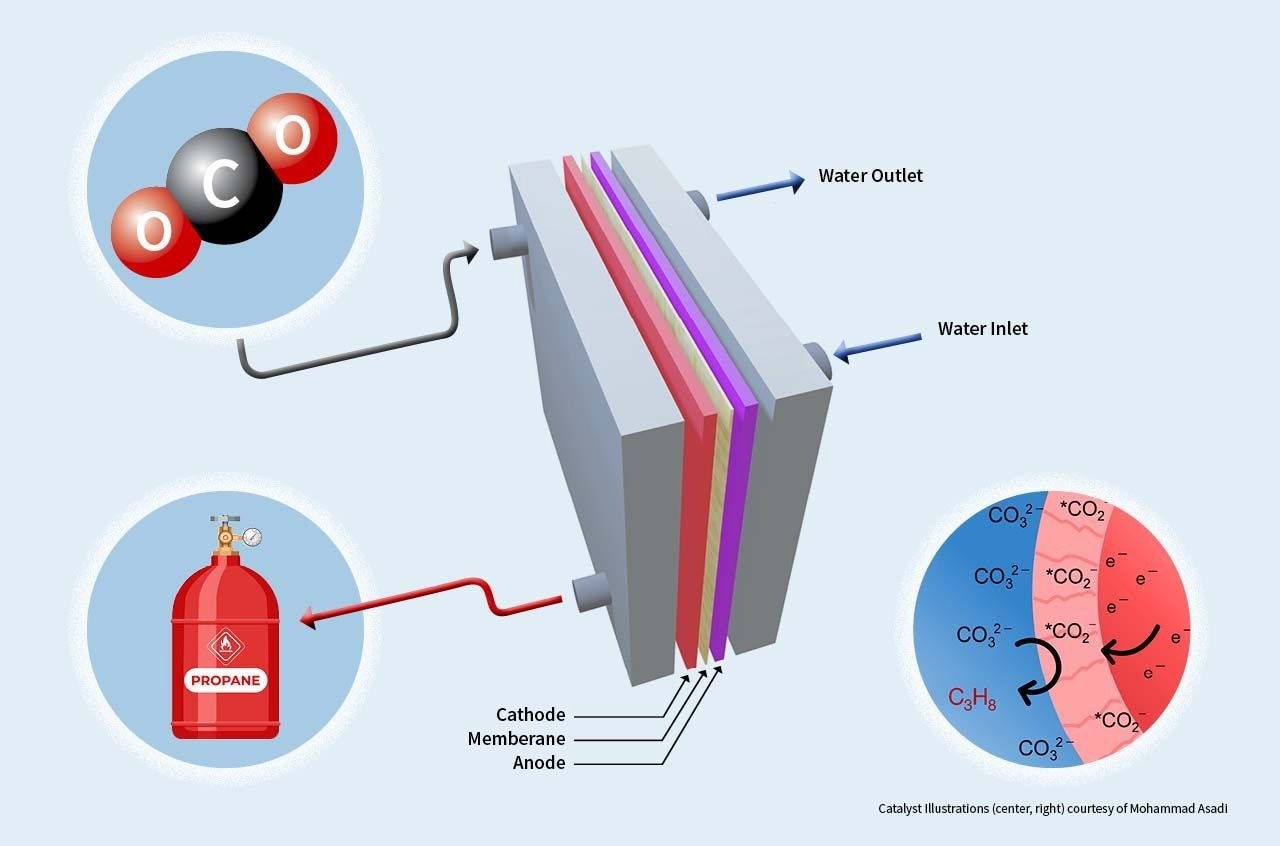A promising discovery in green energy has been published recently published in Nature Energy based on ground-breaking studies done at the Illinois Institute of Technology. This breakthrough describes an electrolyzer device that has the capacity of transforming carbon dioxide into propane in such a way that is both scalable and economically feasible.
 Illustration of electrolyzer, which uses a novel catalyst to convert carbon dioxide into propane. Image Credit: Illinois Institute of Technology
Illustration of electrolyzer, which uses a novel catalyst to convert carbon dioxide into propane. Image Credit: Illinois Institute of Technology
As the US works toward its target of net-zero greenhouse gas emissions by 2050, advanced approaches to minimize the considerable CO2 emissions from industrial and electric power sectors are crucial. This innovative research was led by Mohammad Asadi, who is an Assistant Professor of Chemical Engineering at Illinois Tech.
Making renewable chemical manufacturing is really important. It’s the best way to close the carbon cycle without losing the chemicals we currently use daily.
Mohammad Asadi, Assistant Professor, Chemical Engineering, Illinois Institute of Technology
The unique catalytic systems set the electrolyzer apart. It employs cheap, easily available materials to generate tri-carbon molecules—basic building blocks for fuels such as propane, which are utilized in applications ranging from home heating to aviation.
The team used a combination of computational and experimental methods to ensure a deep comprehension of the catalyst’s operations. This demanding method illuminated the critical elements that impact the catalyst’s reaction selectivity, activity, and stability.
A unique feature of this technology, which lends to its commercial feasibility, is the employment of a flow electrolyzer. This design allows continuous propane production, sidestepping the drawbacks of the more traditional batch processing approaches.
Designing and engineering this laboratory-scale flow electrolyzer prototype has demonstrated Illinois Tech’s commitment to creating innovative technologies. Optimizing and scaling up this prototype will be an important step toward producing a sustainable, economically viable, and energy-efficient carbon capture and utilization process.
Jack Lewnard, Director, Advanced Research Projects Agency-Energy Program
This breakthrough is not Asadi’s first endeavor into sustainable energy. Previously, Asadi used a version of this catalyst in ethanol synthesis, utilizing CO2 from industrial waste products. With a strong knowledge foundation regarding the technology used in the green propane industry, Asadi has worked together with global propane distributor SHV Energy to scale and disseminate the system further.
“This is an exciting development which opens up a new e-fuel pathway to on-purpose propane production for the benefit of global users of this essential fuel,” states Keith Simons, who is the head of research and development for sustainable fuels at SHV Energy.
This work was contributed by Illinois Tech Duchossois Leadership Professor and Professor of Physics Carlo Segre, University of Pennsylvania Professor of Materials Science and Engineering Andrew Rappe, and University of Illinois Chicago Professor Reza Shahbazian-Yassar. The lead author of the paper was Mohammadreza Esmaeilirad (Ph.D. CHE ’22).
Journal Reference:
Esmaeilirad, et al. (2023) Imidazolium-functionalized Mo3P nanoparticles with an ionomer coating for electrocatalytic reduction of CO2 to propane. Nature Energy. doi.org/10.1038/s41560-023-01314-8